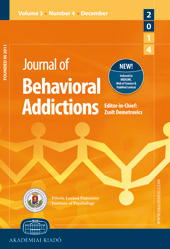The Possible Role of the Insula in the Epilepsy and the Gambling Disorder of Fyodor Dostoyevsky
The Possible Role of the Insula in the Epilepsy and the Gambling Disorder of Fyodor Dostoyevsky
Author(s): Dalma Tényi, Csilla Gyimesi, Norbert Kovács, Tamás Tényi, József JanszkySubject(s): History of Psychology, Cognitive Psychology, Neuropsychology, Behaviorism, Substance abuse and addiction, Health and medicine and law, 19th Century
Published by: Akadémiai Kiadó
Keywords: gambling disorder; gambling-related cognitive distortions; risk prediction–risk prediction error coding system; illness of Dostoyevsky; ecstatic seizure;
Summary/Abstract: The retrospective diagnosis of Fyodor Mikhailovich Dostoyevsky’s (1821–1881) neurological and psychiatric disease proves to be particularly interesting. Recent neurobiological data suggest a solution to the questions regarding the writer’s retrospective diagnosis, claiming the insular cortex to be the origin of the rare ecstatic seizures. Regarding Dostoyevsky’s pathological gambling, this hypothesis is consistent with another finding from recent neuroscience, namely that the malfunction of the insula could be an important underlying pathology in gambling disorder. Case study: Literary and scientific overview (1928–2015) on the subjects of Dostoyevsky’s epilepsy and gambling disorder. Discussion and conclusion: Taking Dostoyevsky’s neurological (ecstatic seizures) and psychiatric (pathological gambling) disease and the crossroads into consideration, these two disciplines make regarding the underlying pathology, we would like to suggest a speculative theory that these two disorders have a common insular pathomechanism, namely, the malfunctioning of the risk prediction–risk prediction error coding system. Furthermore, based on Dostoyevsky’s case, regarding gambling disorder in general, we would like to hypothesize that the three common gambling-related cognitive distortions (near-miss effect, gambler’s fallacy, and the illusion of control) can be all attributed to the impairment of the anterior insular risk prediction–risk prediction error coding system.
Journal: Journal of Behavioral Addictions
- Issue Year: 5/2016
- Issue No: 3
- Page Range: 542-547
- Page Count: 6
- Language: English

